Mctp News

Parolia Lab Receives Grant to Fund New Pediatric Cancer Research
Parolia Lab to expand its research into Ewing Sarcoma with grant funding from Alex’s Lemonade Stand.

Drs. Ali-Fehmi and Mehra Named to Hour Detroit’s 2025 “Top Docs” List
Congratulations to Dr. Rouba Ali-Fehmi and Dr. Rohit Mehra for being named among Hour Detroit magazine’s “Top Docs” of 2025.

From Health Lab: Additional testing can improve kidney cancer diagnosis
A study from the University of Michigan Health Rogel Cancer Center and Department of Pathology shows that further testing in renal cell carcinoma with an overexpression of gene TRIM63 could uncover a mutation otherwise undetected, leading to more treatment options for patients.
Rooted in Science, Growing in Michigan: The Story of Dr. Xiaoming (Mindy) Wang
When Michigan played USC for the first time as Big Ten rivals in 2024, Dr. Xiaoming (Mindy) Wang was not sure which team to root for. After all, USC was her alma mater, but she worked for the Department of Pathology at the University of Michigan. In the end, she and her family wore Maize and Blue and rooted for Michigan - and they were delighted to celebrate a Michigan victory. Wang, who is originally from Beijing, China, was fascinated by science,…
Lanbo Xiao, PhD: Research Faculty Recognition Award
Dr. Lanbo Xiao, a research assistant professor in the Center for Translational Pathology, received a 2025 Faculty Award in recognition of his exceptional contributions to cancer research, teaching, and service. His pioneering work in chromatin remodeling and epigenetic regulation has led to new insights in cancer therapy and significant advances in public health diagnostics.

NIH Featuring CPTAC Investigators: Marcin Cieslik
Featuring CPTAC Investigators: Marcin Cieslik Original Article: Q&A with Marcin Cieslik, Ph.D. - NCI The following is the ninth entry in a Q&A series highlighting selected Clinical Proteomic Tumor Analysis Consortium (CPTAC) researchers and their work. Join us as we discuss CPTAC, the importance of collaboration in science, and advice for the next generation of researchers with Marcin Cieslik, Ph.D., an Assistant Professor and Division Director…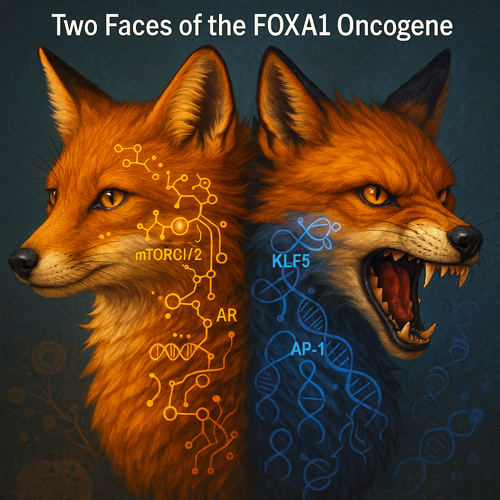
Two Faces, One Oncogene
Our Center’s Discovery in Science Reveals “Two Faces” of the FOXA1 Oncogene Our lab’s recent study, published in Science, uncovers how two different types of mutations—Class 1 and Class 2—in the FOXA1 gene drive the disease at different clinical stages. Prostate cancer is tricky to treat, often changing its form as it grows and spreads. Using mouse models, we show how FOXA1—already known as a major…
Rackham King Talks - Mahnoor Naseer Gondal
On Thursday, January 30, this year’s King Talks featured six Rackham students communicating the relevance of their work to Dr. Martin Luther King Jr.’s legacy in a TED-talk style. As always, the King Talks relate to the theme of the U-M MLK Symposium, which this year is “Restless Dissatisfaction: An Urgent Call for the Pursuit of Justice and Equality.” Mahnoor's talk, entitled "Mentorship Matters: Nurtruing the Next…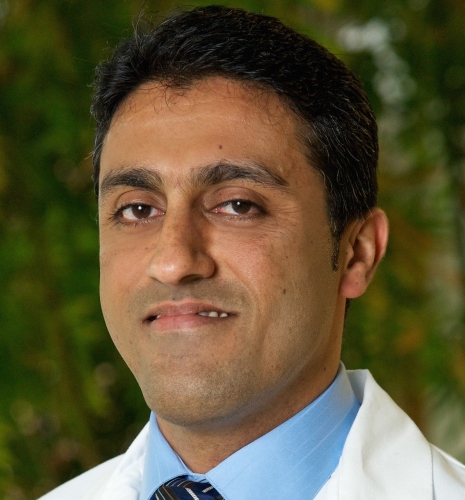
Dr. Rohit Mehra Named to Hour Detroit's 2024 Top Docs List
Congratulations to Dr. Rohit Mehra for being named to Hour Detroit’s 2024 Top Docs List for the second time. The physicians on this list represent those whose peers nominated them as the best in their field on a survey of physicians located in Wayne, Oakland, Macomb, Washtenaw, and Livingston counties. These nominees were then screened and selected by the Professional Research Services for inclusion as this year’s honorees.

Researchers identify factor that drives prostate cancer-causing genes
Researchers at the University of Michigan Health Rogel Cancer Center have uncovered a key reason why a typically normal protein goes awry and fuels cancer.
They found the protein NSD2 alters the function of the androgen receptor, an important regulator of normal prostate development. When androgen receptor binds with NSD2, it causes rapid cell division and growth leading to prostate cancer. The study, published in Nature Genetics, may suggest a new way to therapeutically target prostate cancer. The findings illuminate a phenomenon not previously understood.

And the 2023 Best Paper Award goes to...
Dr. Rohit Mehra, Professor and member of the Michigan Center for Translational Pathology (MCTP), and his international team of collaborators were recently recognized by the Asian Journal of Urology for the best paper published in their journal in 2023. This award-winning study is a literature overview of chromophobe renal cell carcinoma (ChRCC), the third most common RCC subtype.

Dr. Lakshmi Priya Kunju Installed as A. James French Professor of Pathology
Family and colleagues join the celebration.
 copy sq 500.jpg)
Research Finds Possible Therapies to Target Oncogenic Transcription Factors in Multiple Cancer Types
A study from the University of Michigan Health Rogel Cancer Center furthers research that suggests the potential of developing new cancer treatments to target oncogenic transcription factors by indirectly affecting their ability to access enhancer DNA in chromatin.
The findings appear in Cancer Cell.
Led by Arul Chinnaiyan, M.D., Ph.D., S.P. Hicks Professor of Pathology and director of the Michigan Center for Translational Pathology at Michigan Medicine, the research builds on previous work to find genetic vulnerabilities to treat transcription factor-driven cancers like prostate cancer.
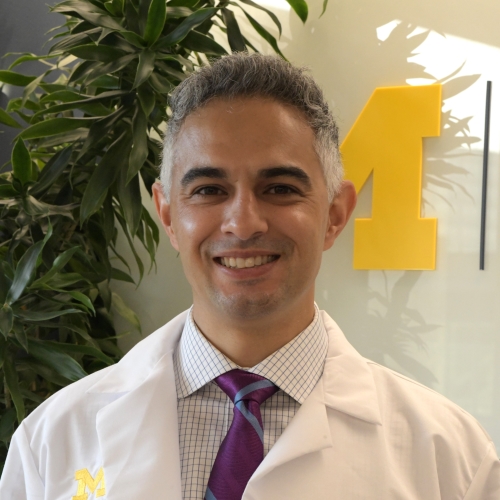
Engineering Hope
Dr. Matthew Iyer's Transformation from Programmer to Pioneering Cancer Researcher

Large study identifies biomarkers for rare kidney tumors
With 20 subtypes of Renal Cell Carcinoma (RCC) listed by the World Health Organization in 2022, determining the specific type of RCC and the correct treatment protocol for patients can be daunting. Only seven of the 20 subtypes had been defined by specific molecular changes and the 20% of RCCs that are classified as non-clear cell RCCs (non-ccRCC), were primarily identified only by histopathologic features. The driving genetic changes had not been identified. A large multi-institutional team making up the Clinical Proteomic Tumor Analysis Consortium, including several researchers from Michigan Medicine’s Department of Pathology, performed multi-omics data analysis on 48 non-ccRCC and 103 ccRCC tumors as well as 101 normal adjacent tissues to study the genetic aberrations found in these tumor types. The findings of this research were recently published in Cell Reports Medicine, with Pathology’s Drs. Alexey Nesvizhskii and Saravana Mohan Dhanasekaran as senior authors and Dr. Ginny Xiaohe Li as first author.

Development and Validation of an 18-Gene Urine Test for High-Grade Prostate Cancer
In a manuscript published this week in JAMA Oncology, senior author Dr. Arul Chinnaiyan and members of the EDRN-PCA3 Study Group reported on their development and validation of a new 18-gene urine-based test for diagnosis of high-grade prostate cancer, MPS2. This test was initially developed in the Department of Pathology.
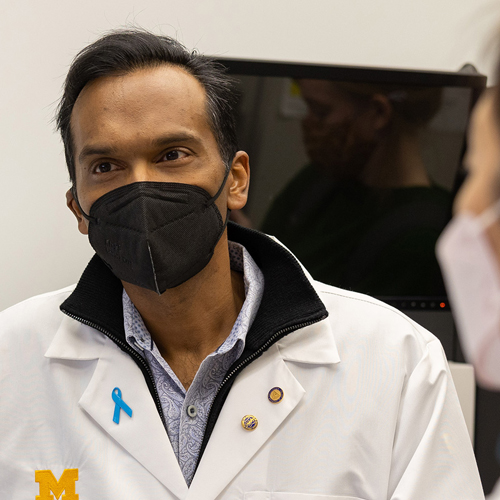
With $5M Grant, Rogel Team Will Conduct Preclinical Work to Develop Drugs Targeting Cancer Master Regulator
University of Michigan Rogel Cancer Center researcher Arul Chinnaiyan, MD, PhD, has received a $5 million grant from the J.C. Kennedy Foundation to conduct laboratory tests of a potential drug candidate targeting a master regulator that controls the majority of genes involved in the most challenging type of prostate cancer. The SWI/SNF chromatin remodeling complex was previously found to facilitate access to enhancers that oncogenes can bind to, driving downstream gene expression in cancer. Degrading a subunit of this complex blocks the oncogenes [...]

Faculty Recognition: Congratulations!
Multiple Department of Pathology faculty members have recently been recognized for their achievements and nominated to leadership roles for their excellence within their respective fields. These members continue to demonstrate the depth of our department's knowledge and research.

Dr. Rohit Mehra - Hour Magazine's Top Doctors of 2023
Dr. Rohit Mehra honored as 2023 Detroit's Top Doctors alongside 5 other pathology colleagues across Metro Detroit.

Study brings insight to kidney cancer with gene mutation
A study from clinicians and researchers at the University of Michigan Rogel Cancer Center, U-M Department of Pathology and the Michigan Center for Translational Pathology reveals findings from over 800 clinical assays performed for kidney patients with MiTF family gene mutations.

Dr. Arul Chinnaiyan Recognized for Outstanding Achievement in Pathology
Dr. Arul Chinnaiyan, S. P. Hicks Endowed Professor of Pathology and Professor of Urology at Michigan Medicine Department of Pathology and Director of the Michigan Center for Translational Pathology, was recently recognized for his outstanding achievements by the American Association of Cancer Research. He was presented with the AACR James S. Ewing-Thelma B. Dunn Award for Outstanding Achievement in Pathology in Cancer Research award at the 2023 AACR Annual Meeting. Please join us in congratulating Dr. Arul Chinnaiyan for this well-deserved prestigious honor!
_2040_500.jpg)
Dr. Lakshmi (Priya) Kunju named Director of the Division of Anatomic Pathology
It is with great pleasure that we announce Dr. Lakshmi (Priya) Kunju as our new Director of the Division of Anatomic Pathology (AP) effective Wednesday, March 1, 2023. We are grateful for all that Dr. Kunju brings to the table including her considerable experience with operations across the division and her willingness to jump in on short notice to ensure stability during this transition. She will work with department leaders and others to identify and recruit to her role as Section Head for Surgical Pathology and Medical Director of our gross room and histology laboratory. Please join us in congratulating Dr. Priya Kunju on her appointment as AP Director. Please also join us in thanking Dr. Liron Pantanowitz for his nearly 3 years as AP Director. He has been remarkably productive in his role and can be proud of a division that is among the VERY BEST team of AP faculty, staff, and learners in the world!
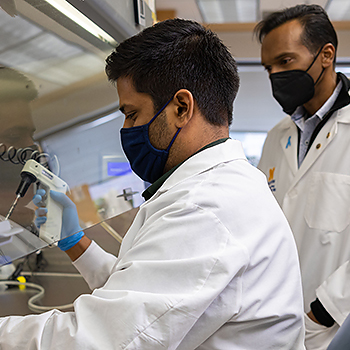
Rogel Researchers Receive $4M Through Prostate Cancer Foundations Inaugural TACTICAL Awards Program
The University of Michigan Rogel Cancer Center researchers received one of the Prostate Cancer Foundation’s four inaugural Class of 2022 TACTICAL (Therapy ACceleration To Intercept Cancer Lethality) Award. This $30 million program will support cross-disciplinary pioneering research toward the goal of developing 21st Century therapies for the most life-threatening form of prostate cancer [...]

Clear Cell Renal Cell Carcinoma study results published
Members of the University of Michigan Department of Pathology and Michigan Center for Translational Pathology, in collaboration with the Clinical Proteomic Tumor Analysis Consortium, recently published a large study on clear cell renal cell carcinomas (ccRCCs), which represent about 75% of the RCC cases and account for the most RCC-associated deaths. This study set out to create a comprehensive profile of ccRCC, combining histologic and molecular profiles. By analyzing both the microscopic cell structures and the genetic makeup of the cells, these researchers discovered significant intratumoral heterogeneity in 90% of ccRCCs. This indicates that ccRCCs originate from multiple tumor cell lines, called tumor subclones, that may become metastatic and could independently influence response to therapies. Through this study, the team was able to molecularly stratify aggressive histopathic subtypes, which may lead to more effective treatment strategies for patients and improved survival.

Cytomorphology and IHC helps diagnose transformed metastatic prostate cancer
A research team from the Michigan Center for Translational Pathology undertook a study to illustrate how careful assessment of cytologic and biomarker features may provide physicians with information on Metastatic Prostatic Cancer (MCP) patients’ prognosis and the best therapies to consider [...]
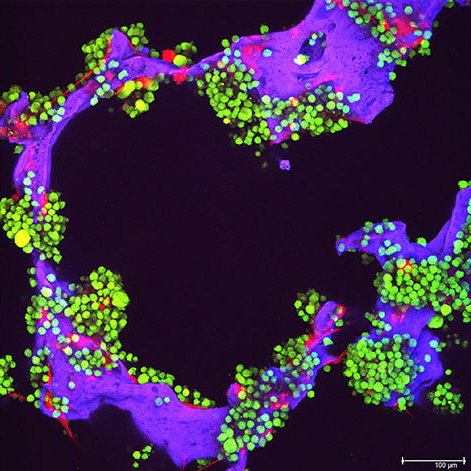
Researchers Find Link Between Genetic Mutations and Cancer Treatment Resistance
Patients with relapsed multiple myeloma are resistant to commonly used treatments. Researchers are one step closer to understanding the genetic reason why.
Using Artificial Intelligence to predict ERG Gene Fusion in Prostate Cancer
The role of artificial intelligence (AI) in healthcare continues to expand. In a recent issue of BMC Cancer, Dr. Vipulkumar Dadhania (first author) and colleagues published a result of their study Leveraging artificial intelligence to predict ERG gene fusion status in prostate cancer. The expert team from the Michigan Center for Translational Pathology developed a deep-learning-based model to predict ERG genomic rearrangements in prostatic adenocarcinomas using only H&E-stained digital slides [...]
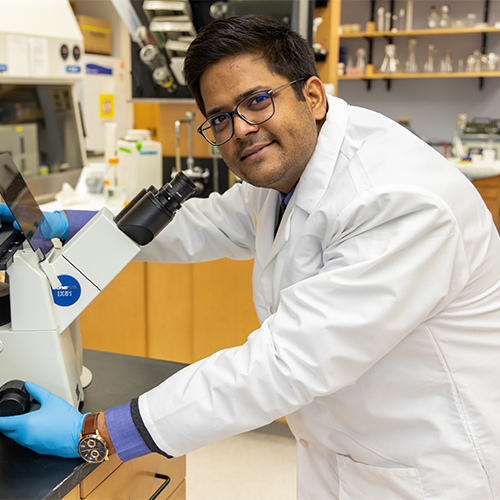
Parolia Selected For Harold Weintraub Graduate Student Award
Please join us in congratulating Dr. Abhijit Parolia on being selected for the 2022 Harold Weintraub Graduate Student Award. The award, established by the Fred Hutchinson Cancer Research Center, is given yearly and recognizes outstanding achievement during graduate studies in the biological sciences [...]

Arul Chinnaiyan, MD, PhD, selected for the Sjöberg Prize in Cancer Research
The Royal Swedish Academy of Sciences, which also awards the Nobel Prizes, announced today that Arul Chinnaiyan, MD, PhD, S.P. Hicks Professor of Pathology and Urology at Michigan Medicine and Director of the Michigan Center for Translational Pathology, has been selected as [...]
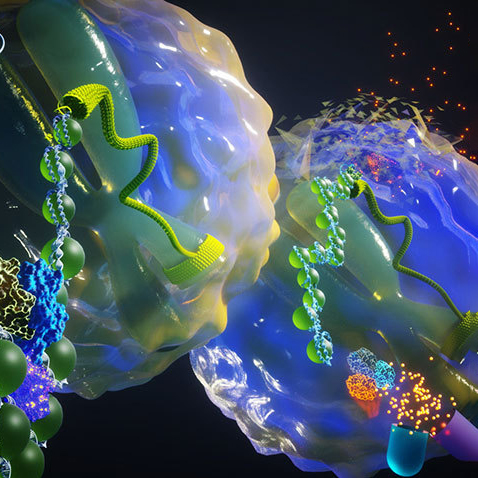
Study Demonstrates a Novel Approach to Target Enhancer-Addicted Cancers
A chromatin degrader stops transcription factors from driving cancer, which may serve as a potential treatment approach for over 90% of prostate cancers.
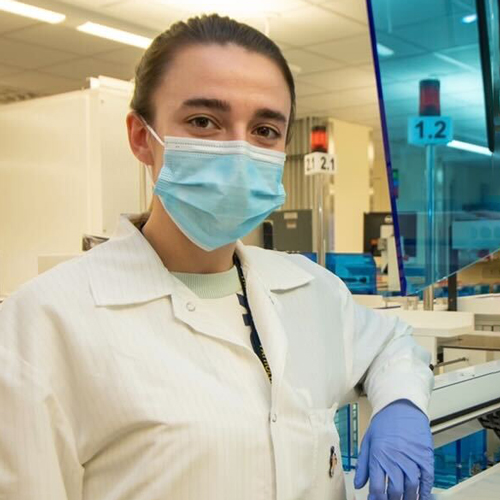
Inside the COVID Pandemic: A Laboratory Perspective
The SARS-CoV-2 virus brought lab testing to the headlines. Learn how Michigan Medicine Pathology responded to this unprecedented challenge.
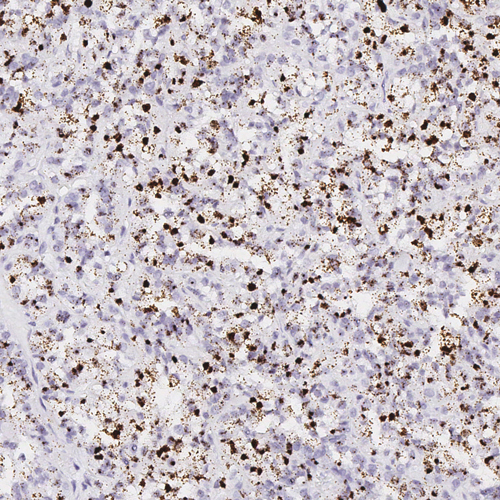
TRIM63 - What is it? (Hint: Not a weight-loss product)
Dr. Xiao-Ming (Mindy) Wang and colleagues from the Michigan Center for Translational Pathology and Department of Pathology published a groundbreaking finding from an inter-institutional study regarding TRIM63 in Modern Pathology [...]
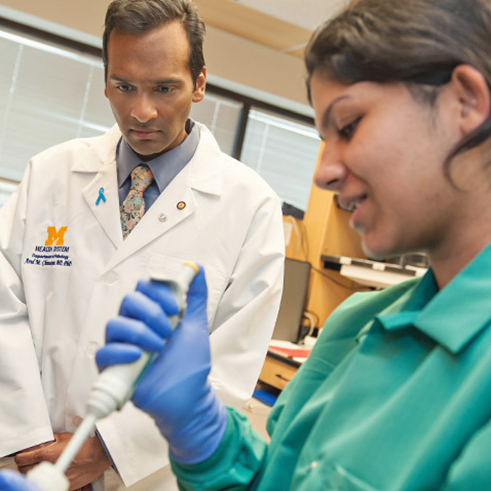
Researchers Uncover Way to Harness the Power of Immunotherapy for Advanced Prostate Cancer
Findings offer clues to why some types of renal cell carcinoma respond to immunotherapy while others do not — it’s a scientific riddle tangled up in a complex web. How do you turn an immune cold cancer into one that responds to immunotherapy?
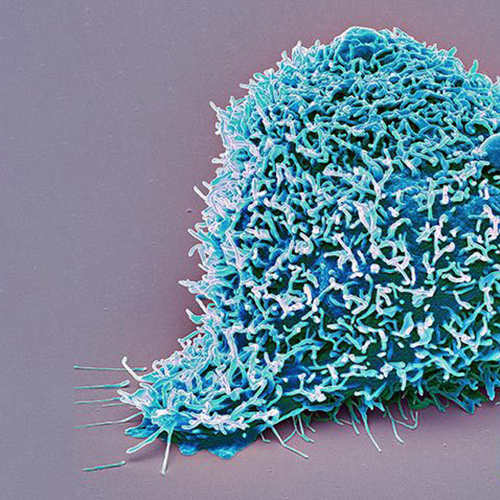
Analysis Reveals How Kidney Cancer Develops and Responds to Treatment
Not all kidney cancers behave the same, with wildly different responses to immunotherapy or other treatments – and wildly different outcomes for patients as a result. By sequencing the RNA of individual cells within multiple benign and cancerous kidney tumors, researchers from the University of Michigan Rogel Cancer Center have identified the cells [...]
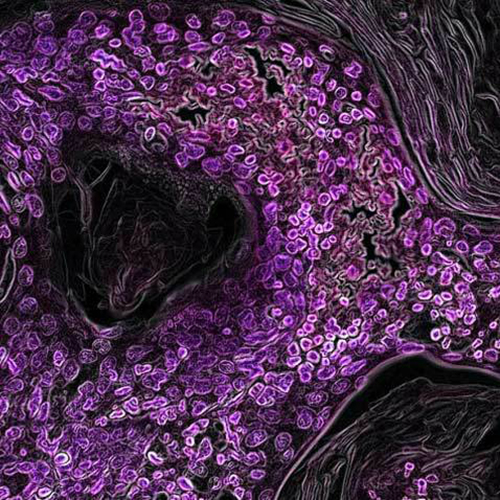
Study Suggests Path to Blocking Common Genetic Driver of Lung Cancer
Stopping the interaction between KRAS and the protein AGO2 slowed tumor growth in mouse models.

Arul Chinnaiyan, MD, PhD, Recognized for Outstanding Research
Congratulations to Arul Chinnaiyan, MD, PhD, who was announced as the Science of Oncology Award and Lecture recipient by the American Society of Clinical Oncology (ASCO). As part of this award, Chinnaiyan will present a 30-minute lecture entitled “Exploring Precision Oncology: from Gene Fusions to Related Genetic Drivers“ at the ASCO Annual Meeting, to be held virtually on June 4-8, 2021 [...]
Arul Chinnaiyan, MD, PhD Recognized for Outstanding Research
Congratulations to Arul Chinnaiyan, MD, PhD, who was announced as the Science of Oncology Award and Lecture recipient by the American Society of Clinical Oncology (ASCO). As part of this award, Chinnaiyan will present a 30-minute lecture entitled “ “ at the ASCO Annual Meeting, to be held virtually on June 4-8, 2021.
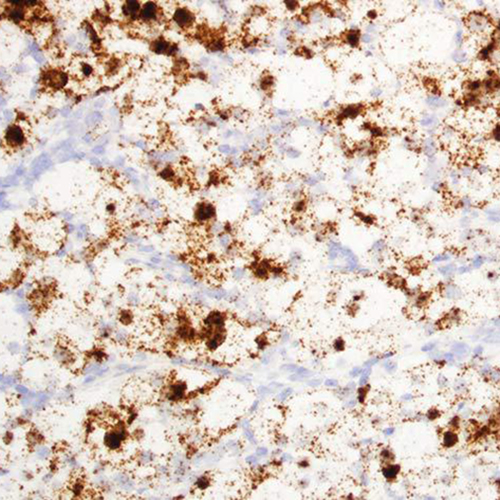
Biomarker Could Help Identify Difficult-to-Diagnose Kidney Cancer Subtype
MiTF renal cell carcinoma can masquerade as other subtypes and may not respond as well to front-line therapies.
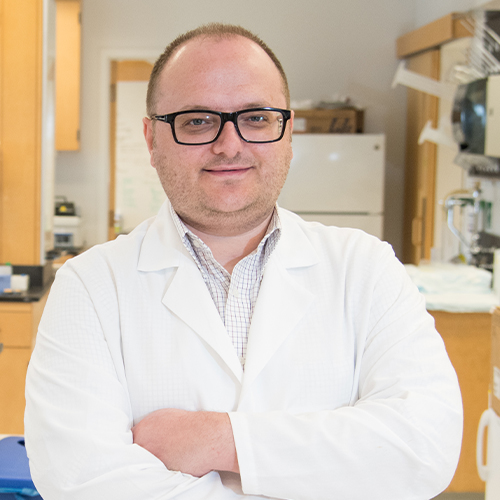
New Assay For Early Detection of Aggressive Prostate Cancers Developed
A new study, led by U-M graduate in molecular and cellular pathology Dr. Andi Cani, was just published in European Urology Oncology. The publication focuses on the development of a whole-urine, multiplexed, next-generation RNA-sequencing assay that is used for the early detection of aggressive forms of prostate cancer [...]
.jpg)
How Useful is Next-Generation Sequencing for Patients with Advanced Cancer?
Patients with cancers of unknown origin greatly benefited from next-generation sequencing; widespread inherited cancer risk also suggests broad utility, a study finds.

"A Correct Diagnosis Can Be Life-Changing": Dr. Rohit Mehra
Dr. Mehra discusses his career path and how he arrived at Michigan Medicine in our latest Careers in Pathology video.

Stressed Cellular Protein HOPS Into Action
Research team discovered that proteins with the capacity to multimerize quickly responded to osmotic changes (dehydration) caused by high saline or sugar concentrations, condensing into aggregates resembling processing bodies (P-bodies). The reaction, known as hyperosmotic phase separation, or HOPS, takes only a few seconds and is reversible within less than 2 minutes [...]

Research from Dr. Udager Published in European Urology
A new publication, generated by Department of Pathology faculty members Drs. Aaron Udager and Scott Tomlins was successfully published in European Urology. The research highlights a longitudinal cohort study centered around the serial molecular profiling of low-grade prostate cancer in order to better assess tumor upgrading [...]

Prostate Cancer Regulator Plays Role in COVID-19, Providing a Promising Treatment Lead
Clinical trials underway are testing whether drugs that target the androgen receptor – successful in controlling prostate cancer – could also work against the coronavirus. wo proteins, ACE2 and TMPRSS2, help the coronavirus gain entry and replicate within cells. TMPRSS2 is well-known to Arul Chinnaiyan, MD, PhD. His lab discovered that TMPRSS2 fuses with the ETS gene to drive more than half of all prostate cancers [...]

Research Regarding Microcystic Adnexal Carcinomas Published
The research was just published in Modern Pathology and highlights the importance of next-generation sequencing within oncogenic roles for P53 and JAK/STAT signaling in microcystic adnexal carcinomas.

U-M Researchers Home in on Key Player in Pancreatic Cancer Development
The protein Argonaute 2 was found to be critical to the progression from benign lesions into pancreatic cancer, suggesting a therapeutic opportunity.
Research Regarding Invasive Squamous Cell Carcinoma Published
The research, which focuses on invasive squamous cell carcinomas and the precursor lesions that demonstrate concordic genomic complexity in driver genes, was just published in Modern Pathology.

Research about Renal Cell Carcinoma in Young Adults Published
The research was just published in Histopathology and features prominent contributions from our faculty.

Arul Chinnaiyan, MD, PhD, elected to the National Academy of Science
Congratulations to Arul M. Chinnaiyan, MD, PhD, on his election to the National Academy of Science! Chinnaiyan is an investigator, Howard Hughes Medical Institute; and S.P. Hicks Endowed Professor of Pathology, American Cancer Society Research Professor, and director, Michigan Center for Translational Pathology, University of Michigan Medical School, Ann Arbor [...]
Marcin Cieslik Receives Award from Bristol-Myers Squibb
Marcin Cieslik, Assistant Professor of Pathology and Computational Medicine and Bioinformatics and member of the Michigan Center for Translational Pathology (MCTP), received an award from Bristol-Myers Squibb (BMS) for the project entitled, “Identification of novel therapeutic vulnerabilities across immunophenotypes of refractory and metastatic tumors.” This award provides two years of funding.
Engaging Our Future
Department faculty outreach to high school students to educate about careers in medicine and research.
Faculty and Trainees Work to Understand Therapy-Resistant Malignancies
Two Michigan Medicine Fellows, Caroline Simon, MD, and Stephanie Skala, MD, (who recently joined the Department of Pathology as faculty), joined colleagues from the Michigan Center for Translational Pathology, in a research study published in Diagnostic Pathology dated October 21, 2019 [...]
U-M Compounds Show Promise in a Lab Model of Advanced Prostate Cancer
A new study finds that U-M-designed compounds led to significantly smaller, slower-growing tumors.
Witnessing the dance of RNAs around droplets of cellular degradation machinery
If a picture's worth a thousand words, a video is perhaps worth much more.
Medicine, Humility, Respect, and Beyond
Rohit Mehra, MD—faculty perspective on the need to understand why a patient’s cancer would not respond to treatment.

Team Led by Dr. Rohit Mehra discovers New Diagnostic Biomarker for Kidney Cancer
A recent collaborative study out of the Michigan Center for Translational Pathology (MCTP) has led to new insight into kidney cancer. The resulting paper, VSTM2A Overexpression is a Sensitive and Specific Biomarker for [...]